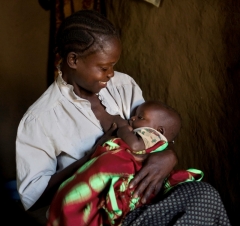During World Breastfeeding Week, please join us in reinforcing and sharing the importance of breastfeeding for preventing the transmission of HIV from mothers to babies and for improving the health and survival of children around the world.
For decades, the public health community has recommended that women exclusively breastfeed their infants, citing breastmilk’s important nutritional benefits and the protection it offers against infection and disease.
Yet over the past ten years, in response to the HIV epidemic, child health programs have made major shifts in the ways mothers feed and nurture their infants. Some mothers, worried about transmitting HIV through breast milk, have stopped breastfeeding altogether, while others have shortened their usual duration of breastfeeding.
But, we now know that children of HIV-positive mothers can greatly benefit from breastfeeding. Exclusive breastfeeding for six months not only reduces the risk of HIV transmission compared to breastfeeding along with adding other foods and fluids, it also improves a child’s chances of surviving and remaining HIV free. On the other hand, replacing breast milk with infant formula increases mortality by as much as six times, and stopping breastfeeding early can have a three-fold increase on mortality.
Nutrition interventions are strongly needed that can both prevent mother-to-child transmission of HIV and protect children’s overall health. Mothers with HIV must receive support and clear information about how best to feed their babies to keep them healthy, encourage their growth and development, and keep them free of HIV.
- Increase support for breastfeeding. Improve counseling for mothers on infant feeding to promote exclusive and continued breastfeeding, and expand support to mothers.
- Avoid providing infant formula as a routine part of programs to prevent mother-to-child transmission of HIV.
- Strengthen education about complementary feeding. Promote local, nutrient-rich complementary foods.
- Prioritize antiretroviral (ARV) therapy and prophylaxis among pregnant and lactating women. Implement programs to provide CD4 count testing to identify pregnant and lactating women in need of ARV therapy. Make extended infant prophylaxis regimens available for women who do not meet criteria for ARV therapy for their own health.
- Improve coordination between maternal care services and HIV treatment services to provide mothers with a full package of nutrition and health interventions.
Read an article by the IYCN Project’s Wasiu Afolabi about Nigeria’s experience interpreting and adopting the new World Health Organization (WHO) guidelines on infant feeding and HIV.
Download the new full-length WHO guidelines on infant feeding and HIV.
View and share our research brief summarizing the latest evidence on infant feeding and HIV and recommendations for improving child health and HIV-free survival.
Read a summary of the AIDS 2010 conference satellite session on infant feeding and HIV, co-hosted by IYCN, the Elizabeth Glaser Pediatric AIDS Foundation, WHO, and mothers2mothers.
Look for more IYCN resources on infant feeding and HIV coming soon. During World Breastfeeding Week and beyond, let’s spread the word about the benefits of good infant feeding practices for preventing HIV and improving the health and survival of children around the world.
Sincerely,
Denise Lionetti, Project Director
Infant & Young Child Nutrition Project
Photos: Aurelio Ayala III, Evelyn Hockstein
Date: Aug 13, 2010 | Category: News alerts

